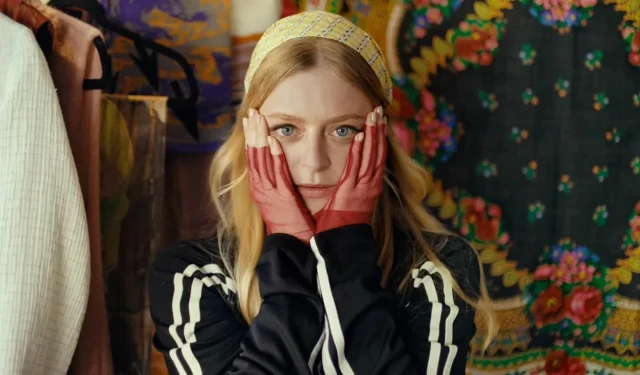Unpacking the Quirky Aesthetic of *Idiotka*
“I would describe my aesthetic as Old World trash and treasure,”remarks Margarita (Anna Baryshnikov) in *Idiotka*. This vivid description highlights her eclectic personality, where a quirky mix of influences coalesces into a unique style. The film itself mirrors this blend of chaos and charm, showcasing the distinctive voice of writer-director Nastasya Popov. While it may be messy and audacious, *Idiotka* is undeniably infused with a tantalizing personality that captivates viewers.
A Satire of Reality Show Culture
In its initial act, *Idiotka* adopts a satirical lens to critique the often soulless nature of reality television. Margarita’s quirky explanation of her style serves as an audition tape for a show that specifically seeks underprivileged aspiring designers. The reality show demands contestants prove their impoverished status through tax forms, emphasizing their struggles as a selling point. Host Oliver (Owen Theiele) and producer Nicol (Camila Mendes) are in pursuit of candidates willing to disclose their painful backstories, effectively commodifying personal trauma for entertainment value.
Family Dynamics and Authenticity
Margarita’s supportive yet cautious family—her grandmother Gita (Galina Jovovich), brother Nerses (Nerses Stamos), and father Samuel (Mark Ivanir)—wrestle with the show’s focus on hardship. Despite their own dire financial situation, which includes being several months behind on rent in their cramped West Hollywood apartment, they see Margarita’s opportunity as a potential lifeline. Their sellable stories become points of interest for Nicol and Oliver, who thrive on the sensationalism of their emotional struggles, with Nicol declaring, “We love unhinged.”
The Commodification of Pain
Popov skillfully underscores the disingenuous facade of showbiz compassion throughout *Idiotka*. As the contestants, including the fashion-forward Jung-soo (Jake Choi) and the artsy Malcolm (Shaun J. Brown), navigate the demands of the producers, it becomes evident that authenticity is simply a buzzword. Margarita is pushed to play the “victim”and is encouraged to submit the most humiliating clips of her family life, turning their private pain into publicly consumable “great material.”
Balancing Satire with Heartwarming Family Drama
As the narrative unfolds, however, *Idiotka* begins leaning more toward heartwarming family dynamics, which slightly diminishes the film’s satirical edge. The film shifts from sharp commentary to a heartfelt exploration of family bonds, creating a sometimes jarring contrast between the absurdity of the reality show and the authenticity of family interactions. Margarita’s style, humorously likened to a “slightly curated laundry hamper,” reflects this blend of chaos and tenderness.
Performance Highlights
Despite some of its tonal inconsistencies, *Idiotka* finds strength in the performances. Baryshnikov navigates the transition between comedy and drama with impressive agility, providing a nuanced portrayal that captivates audiences. Jovovich shines as Gita, embodying a character whose vibrant personality enhances the film’s emotional landscape. Furthermore, Ivanir’s portrayal of Samuel is multifaceted, eliciting both sympathy and pride in his daughter’s aspirations, crafting a genuine familial atmosphere that feels inviting and warm.
A Unique Perspective
Ultimately, *Idiotka* expresses a conflict within itself—struggling between sharp cultural critique and heartfelt storytelling. It remains uncertain how far to delve into its satire, yet it possesses an undeniable charm that resonates with viewers. The film emerges as a testament to a unique cinematic voice, brimming with potential and originality. As it artfully navigates the complexities of life, family, and ambition, *Idiotka* leaves audiences eager for what Nastasya Popov will create next.


